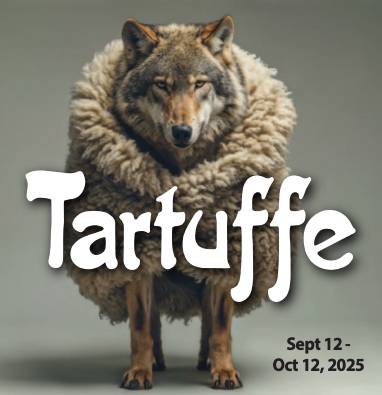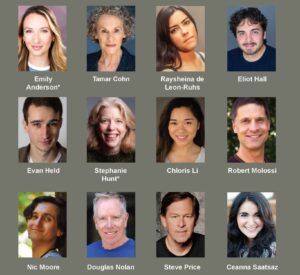
Groovy Spin on Molière’s Satire
Ross Valley Players kicks off its 96th season with a fresh interpretation of Tartuffe at the Barn Theatre in Ross. Under Adrian Elfenbaum’s direction, Molière’s 17th-century satire of hypocrisy lands in late-1960s Southern California—an era awash in paisleys, flower power, and cultural upheaval. Richard Wilbur’s sparkling verse translation finds fresh energy in this groovy setting, where mod fashion and psychedelic flair sharpen both the comedy and the bite.
An unusual 5-act structure — a comedy built as a symphony of folly.
Unlike most modern 2-act evenings, Tartuffe moves in 5 deliberate steps, with intermission arriving after Act 3—a natural pause, just as Tartuffe has wormed his way deepest into the household. Each act raises the stakes until the family teeters on collapse:
-
Act 1: Orgon brings home Tartuffe, hailed as a saint by him, a fraud by everyone else.
-
Act 2: Orgon orders his daughter Mariane to marry Tartuffe, sidelining Valere.
-
Act 3: Tartuffe makes a play for Elmire; Orgon, blinded, disinherits his son and signs over the estate. Curtain — and intermission.
-
Act 4: Elmire stages the reveal; Orgon hides and hears Tartuffe’s brazen hypocrisy firsthand.
-
Act 5: The tables turn—Tartuffe is exposed and justice restores the household.
The cast leans into this arc with gusto.
Steve Price’s Tartuffe is pious self-deprecation on the surface, lust underneath.
Price, who also produced, plays Tartuffe less as a silver-tongued seducer and more as a man dripping with false humility, forever bowing and scraping while his eyes are fixed on Elmire. The oily charm is subdued; what comes through is the mix of sanctimonious self-abasement and a barely concealed desire for Orgon’s wife. It’s an interpretation that underscores Tartuffe’s hypocrisy, though it sometimes left me wishing for more of the sly persuasiveness that would explain Orgon’s blind devotion.
Douglas Nolan (Orgon) is hilariously blinkered—the dad who’ll ignore a marching band in his living room if Tartuffe tells him to close his eyes. Stephanie Hunt (Elmire) is witty, grounded, and finally triumphant in the pivotal unmasking scene. Emily Anderson (Dorine) nearly steals the show with razor timing, while Chloris Li (Mariane) and Eliot Hall (Valere) keep the lovers’ subplot afloat with charm.
Photo Credit:Robin Jackson
This is a big cast, each carrying a heavy line load, and the delivery throughout the evening was crisp and professional. What took many by surprise was that the dialogue was spoken entirely in rhyme. It gives the play a buoyant rhythm and often lands a laugh, but it can also make some passages harder to follow.
Molière’s timeless warning: blind faith in false prophets can upend families and societies alike.
That’s the sting that gives Tartuffe staying power. Still, for me the evening was more intriguing than fully enjoyable. The verse kept me at a distance, the characters felt more like caricatures than people to believe in, and the sudden happy ending—famously revised by Molière to appease royal censors—lands as a contrived resolution. But that is the play itself, not the production, and others may find more delight in its clever rhymes and exaggerated characters.
Ross Valley Players offers a Tartuffe that is solidly staged and thoughtfully reimagined. Nearly 400 years on, the play’s mix of satire and farce still sparks discussion. In the Barn’s intimate setting, this production gives audiences a chance to see why Molière’s classic continues to endure—even if its style and conclusions may divide opinion.
Runs through October 12, 2025, at the Barn Theatre in Ross. Tickets $45 (discounts for members and youth under 18). RossValleyPlayers.com • 415-456-9555
★★★★★
Each review is created through my proprietary FocusLens℠ method—an original editorial process shaped by firsthand experience, critical insight, and structured narrative design. Original photography, graphics, director quotes, and animated elements are incorporated to enhance reader engagement and visual impact. State-of-the-art scaffolding systems support organization and phrasing, but every sentence and decision reflects my own voice and judgment. These are not AI-generated reviews—they are authored, shaped, and published by me.




